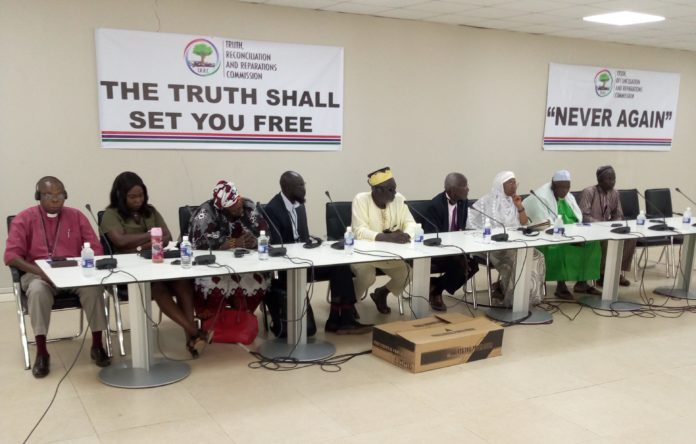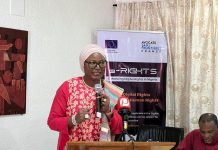By Momodou Jarju
As a continuation of last Thursday’s sitting of the Truth, Reconciliation and Reparations Commission (TRRC), Commissioners took turns to engage Brigadier General Alagie Martin on the alleged severe beatings and inhumane treatment he meted out on people during the reign of terror of ex-President Yahya Jammeh.
In his intervention, Commissioner Dr. Lamin Sise, the Chairperson of the Commission disagreed with the witness that the art of questioning even our own children to obtain information in this country, is not done through coercion and asked Brig. Gen. Martin how he feels to rise through the ranks, to be a Brigadier General in the Armed Forces of the Gambia (GAF).
In his response to Dr. Sise, Brig. Gen. Martin emphasized that it was the situation at the time that led to the atrocities they committed on people; that coups and counter coups and fighting for position, was the order of the day, which brought about mistrust amongst them as soldiers.
“On three occasions we started seeing coup d’état’s happening,” he responded to Dr. Sise.
In her question to Brig. Gen. Alhagie Martin, Commissioner Jones asked the following: ‘‘Babou Janha, Ndure Cham’s driver told the TRRC that you supervised his arrest during which he was beaten. What do you say to this?’’ In his response to the question, Brig. Gen. Martin concurred with the assertion. Commissioner Jones further asked him if he regrets his actions and at what point in time he regretted them. In his response, Brig. Gen. Martin responded that after the foiled 2006 coup of Ndure Cham, what he saw was too much. “Even an officer who was married to my sister, was killed,” he said.
At this juncture, Lead Counsel Essa Faal raised a point of order to shed some light on the answer Brig. Gen. Martin gave as response to Commissioner Jones’ questions on his regret since 2006.
Counsel Faal: “This is what he said in 2011. Brigadier General Martin told newly promoted non-commission officers in Banjul to sacrifice for their country at whatever cost; that it is time for us to nurture extra sacrifice for this country, work for our leader, our people and for our country. The Gambia is what we have. We must also work as a team and family, respect one another. Let us sacrifice and be prepared to die for our commander in chief. I leave it at that.”
Continuing her questions, Commissioner Jones asked Brigadier General Martin why he did not resign given that the situation was tense and that some witnesses before TRRC said they resigned to avoid committing more atrocities?
This was how Brig. Gen Martin responded: “Resign? No! I am working. I have to work. One has to work and earn a leaving. I have to work for this country. I have served for almost 38 years now.”
At this point, Commissioner Sosseh, who is also the Vice Chairperson of the TRRC, informed Brig. Gen. Martin that by 2006, he was a mature person and not as young as he claimed.
Corroborating Martin’s answer to Commissioner Jones’ question, Vice Chairperson Sosseh argued that for Martin to save his position, he was ready to sacrifice the lives of his colleagues through fabrication to make sure that they were sentenced to prison for 25 years or more together with other innocent civilians. She then asked Brig. Gen. Martin how that sits in his conscience today.
However, Martin maintained that it was the situation at the time which was characterized by coups and counter coups. “Even myself if am accused, they will (i.e. tortured or killed),” he added.
Commissioner Kah also asked the following: “Don’t you think you contributed to creating the situation you claimed you abhorred by obeying illegal orders?” Brig. Gen. Martin responded in the negative and maintained that it was as a result of coups and counter coups.
Kah further asked whether he had apologized to the victims he mishandled, and he responded that he asked Bunja Sanyang for forgiveness; but that for others, he did not have the opportunity which he will do if he has.
On his part, Commissioner Kinteh asked the witness whether it was to die for the leader or the country and Martin responded that the “leader is the country. If you say you die for the leader, you die for the country,” he added.
Commissioner Jallow also asked the witness how he can assure Gambians that the torturing and killings will never happen again, when such atrocities lasted for 22 years. Brig. Gen. Martin said the new dispensation is democratic and they are working hard to ensure the ‘Never Again’ campaign is inculcated in the military.
Commissioner Jallow who looked visibly unhappy with the response of the witness, told him that it is very unfortunate that the perpetrators of the torture and killings meted on Gambians are still serving in the country’s military.
Other commissioners asked similar and related questions but Brig. Gen. Martin was adamant that it was the situation at the time that produced the “terrible situation.”

















